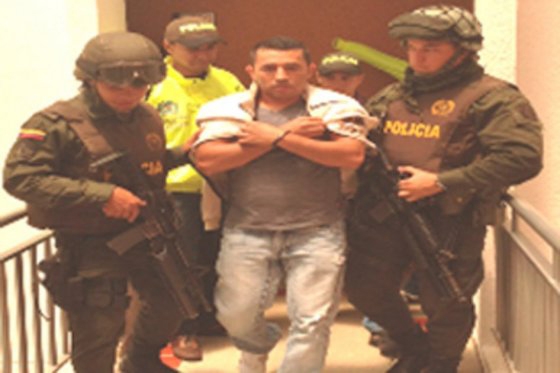Colombian police captured the alleged head of a local drug distribution network in the country’s coffee region, as the government highlighted the growing problem of domestic drug consumption.
Carlos Alberto Cifuentes Romera, alias “Condorito” (Little Eagle), is accused of leading a gang known as “Los Rolos” which distributed and sold marijuana, cocaine and “bazuco” (a cheap variety of crack cocaine), in the central Colombian departments of Caldas, Quindio and Risaralda.
According to the National Police, Cifuentes took over leadership of Los Rolos from Luis Fernando Martinez, alias “Rigo,” who now manages a “gigantic network dedicated to micro-trafficking in Bogota,” reported El Espectador. The two men remain close allies, with Cifuentes receiving drug shipments from Martinez, who is seeking to extend his reach across the country, according to the paper. Police have offered a reward of around $60,000 for information leading to Martinez’s capture.
Meanwhile Colombia’s national anti-drugs coordinator at the government’s Social Protection Ministry named Pereira, the biggest city in the coffee region, as one of three hot-spots for domestic drug consumption, reported newspaper La Opinion. Aldemar Parra said Bogota, Medellin and Pereira were the three cities with the biggest drug consumption patterns, warning that teenagers as young as 14 were taking drugs including marijuana and heroin.
InSight Crime Analysis
The dismantling of major organizations such as the Medellin and Cali cartels, the weakening of successors such as the Rastrojos and the capture of prominent traffickers such as Daniel “El Loco” Barrera have made the domestic drugs market increasingly important to Colombian criminal groups.
Authorities have made it harder to shift product out of the country, while Colombia’s economic advancement has provided a growing market of middle class consumers – a combination of factors which has contributed to a boom in micro-trafficking.
National Police Director General Jose Roberto Leon Riaño told newspaper El Tiempo in December 2012 that the “transition to a criminal economy of micro-trafficking” following the dismantling of the cartels was responsible for violence in many Colombian cities.
A report last month following the deaths of five members of a Bogota street gang estimated the group was bringing in more than $300,000 a month selling drugs at 20 distribution points in the north of the city, an indication of the huge potential profits available.

